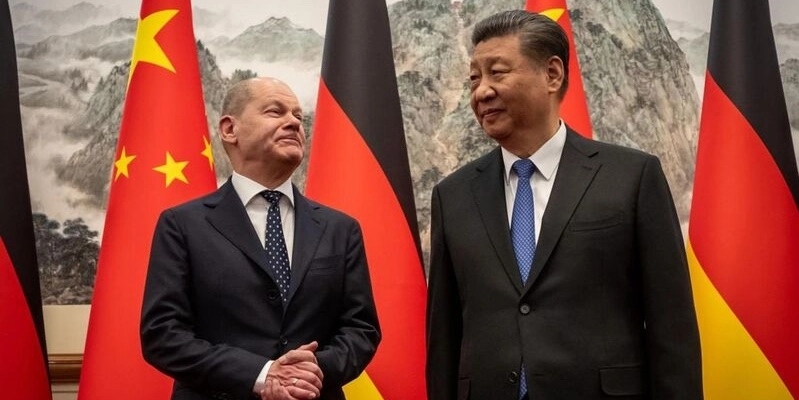The European Commission announced provisional anti-dumping tariffs on electric vehicles (EVs) from China on June 12.
Now, almost a month later, it has confirmed the imposition of preliminary countervailing duties on imports.
This measure has generated notable resistance, especially from Germany, a leader in the automotive sector in Europe and consequently one of the potentially most affected countries.

In this context, German Chancellor Olaf Scholz is reported to have intervened in the conflict between the European Union (EU) and China.
According to the Press and Information Office of the Federal Government of Berlin, as shared with Mobility Portal Europe, “a consensual solution would be very desirable and the right approach in international trade relations.”
In this regard, they state that the administration supports the talks conducted by the Commission.
“Germany has always emphasised what this is about and what it should continue to be about, namely, protecting free and fair competition and not building new mutual barriers in the long term,” said Wolfgang Büchner, deputy spokesperson for the executive branch.
Therefore, from the outset, the country has advocated for carefully considering and balancing all relevant interests in anti-subsidy investigations.
In the automotive industry, there is a concern related to the considerable dependence on sales in the Chinese market, which could result in substantial losses for European car manufacturers.
Additionally, a significant portion of their sales are made in China.
For weeks, Mercedes-Benz, BMW, and Volkswagen have voiced opposition to these measures, warning about the possibility of countermeasures by the Asian country against local manufacturers.
This could directly impact the profits and benefits of these companies in China.
They have also expressed that these tariffs completely undermine international free trade.
Germany, in particular, has a significant trade surplus in cars with the Asian country.
In 2023, automobiles worth 15.1 billion euros were exported from the European nation to China.
Additionally, car suppliers exported parts worth 11.2 billion euros there.
According to Bloomberg, the shares of local automakers such as Volkswagen Group, Mercedes-Benz Group AG, and BMW AG fell by more than two per cent in early trading this year.

Hildegard Mueller, president of the German Association of the Automotive Industry (VDA), commented:
“China is an important market for German car manufacturers, whose revenues contribute to financing the green transformation in the country.”
In this context, she argues that the proposed tariffs make it “more difficult to successfully promote electromobility” and thus decarbonise and achieve the Paris CO2 climate goals.
They also harm both European consumers and local companies.
“Therefore, they are not in the interest of the EU,” she emphasises.
In this regard, she suggests that the European Commission should forgo the announced anti-subsidy tariffs and find a negotiated solution with China.
At the same time, the German Federal Government maintains that it is essential for the Chinese side to make significant movements and advances.
“Generally speaking, China has the capacity to contribute to a level playing field,” the spokesperson states.
Therefore, he underscores that the call for the Asian country to address “both its capacity surpluses and its irregular subsidies” remains valid.
How is the eMobility transition progressing in Germany?
The last few months have not been very positive regarding the transition to electric mobility in the EU country, especially after the environmental bonus was eliminated last December.
According to statistics from the Federal Motor Transport Authority (KBA), new registrations of electric vehicles continue to show negative numbers.
In June 2024, 43,412 EVs were on the roads, 18.1 per cent less than in the same month of the previous year.
Since the beginning of the year, the number of zero-emission car sales has been 184,125 units, 16.4 per cent less than in the first half of 2023.
In light of this situation, Mobility Portal Europe contacted the Press and Information Office of the Federal Government of Berlin regarding the government’s plans to promote this sector and its inclusion in the next budget.
However, no response was received.








